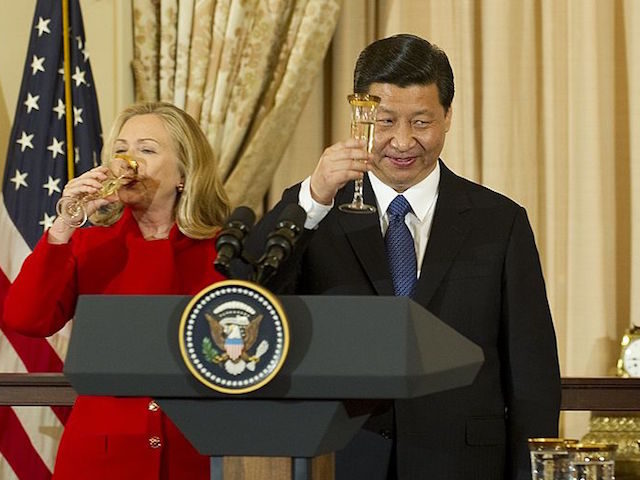Former Secretary of State Hillary Clinton (D) downplayed China’s threat during a Monday discussion with the Atlantic Council, stating that people “can’t blame a country for acting in its own self-interest.”
Clinton added that we should “question ourselves for not being more effective in how we deal with China’s new, more aggressive, ambitious approach.”
Clinton, in a discussion on U.S. foreign policy, downplayed China’s threat while placing blame on the Trump administration, which has consistently emphasized the importance of both acknowledging China’s threat and actively taking action against the communist regime.
When asked what China strategy the next president should embrace, Clinton dismissed the Trump administration’s approach.
The U.S. has gone through many phases with China, she said, explaining that it was in America’s interest and the world’s interest to “support China’s economic rise to work to include China in the international order in all kinds of institutional ways.”
Any relationship constantly reevaluated, Clinton continued, explaining that the aggressive nature of China’s ambitions is very clear “militarily, strategically, economically, [and] internationally.”
The U.S. needs a “clear and consistent approach to China,” which Clinton proclaimed, “We have not seen under the Trump administration.”
While she noted the series of economic actions taken, she said they were “not particularly effective from what I have seen, and a lot of name-calling.”
All the while Clinton said China has expanded its influence “not only across Asia but into Africa, into the South Pacific, even into Europe and certainly Latin America.”
“China is not only building infrastructure nationally but through a competitive infrastructure bank that it has set up,” she said, explaining that China is “playing the long game” and adding that U.S. cannot blame the communist country for supposedly acting in its own self-interest.
“And as I say, you can’t blame a country for acting in its own self-interest. We can question ourselves for not being more effective in how we deal with China’s new, more aggressive, ambitious approach,” the failed Trump challenger said.
“And basically with Trump as president, we are absent,” she later added. “We are absent symbolically and we are absent substantively.”
“So there’s a real opportunity here, Fred, that I think that a Biden-Harris administration would quickly seize to try to get our relationship with China back on a steadier more predictable course and reassert America’s standing and leadership in Asia and beyond,” she said:
Clinton is the latest high-profile progressive to effectively downplay China’s threat and the Trump administration’s response to the communist country, particularly since the Chinese coronavirus pandemic struck the nation.
“What the president is saying about China is interesting,” Nancy Pelosi told reporters in May, referring to his focus as an “interesting diversion.”
Joe Biden (D) has repeatedly dismissed China’s threat throughout his presidential campaign.
“China is going to eat our lunch? Come on, man. They can’t even figure out how to deal with the fact that they have this great division between the China Sea and the mountains in the East,” he said at an Iowa campaign event last year.
“I mean in the West. They can’t figure out how they are going to deal with the corruption that exists within the system. I mean, you know, they’re not bad folks, folks. But guess what: they’re not competition for us,” he continued.
Peter Schweizer, Breitbart News senior contributor and president of the Government Accountability Institute, unveiled the layers of corruption of Biden’s ties to China in his New York Times bestseller Secret Empires: How the American Political Class Hides Corruption and Enriches Family and Friends.
In a 2018 interview on Breitbart News Tonight, Schweizer explained:
In December of 2013, Vice President Joe Biden flies to Asia for a trip, and the centerpiece for that trip is a visit to Beijing, China,” said Schweizer. “To put this into context, in 2013, the Chinese have just exerted air rights over the South Pacific, the South China Sea. They basically have said, ‘If you want to fly in this area, you have to get Chinese approval. We are claiming sovereignty over this territory.’ Highly controversial in Japan, in the Philippines, and in other countries. Joe Biden is supposed to be going there to confront the Chinese. Well, he gets widely criticized on that trip for going soft on China. So basically, no challenging them, and Japan and other countries are quite upset about this.
…
Well, I think the reason he goes soft on China is because with him on that trip, flying on Air Force Two, is his son Hunter Biden, and ten days after they return from China, Hunter Biden — who has this small firm, he has no background in private equity, he has no background in Chinese finance — gets a whopping $1.5 billion deal from the Chinese government. This is the Chinese government giving Joe Biden and a [John] Kerry confidante the management over this money, and they made huge fees off of this money, and it’s an example of this kind of corruption. That’s the first of three major deals that the Chinese government does with people who are either the children — that is the sons — or close aides to Vice President Biden or Secretary of State John Kerry.
Biden has continually dismissed China’s threat, telling a group at a January campaign event in Ames, Iowa, “The idea that China is going to eat our lunch — It’s like I remember the debates in the late nineties — remember Japan was going to own us? Give me a break.”

COMMENTS
Please let us know if you're having issues with commenting.